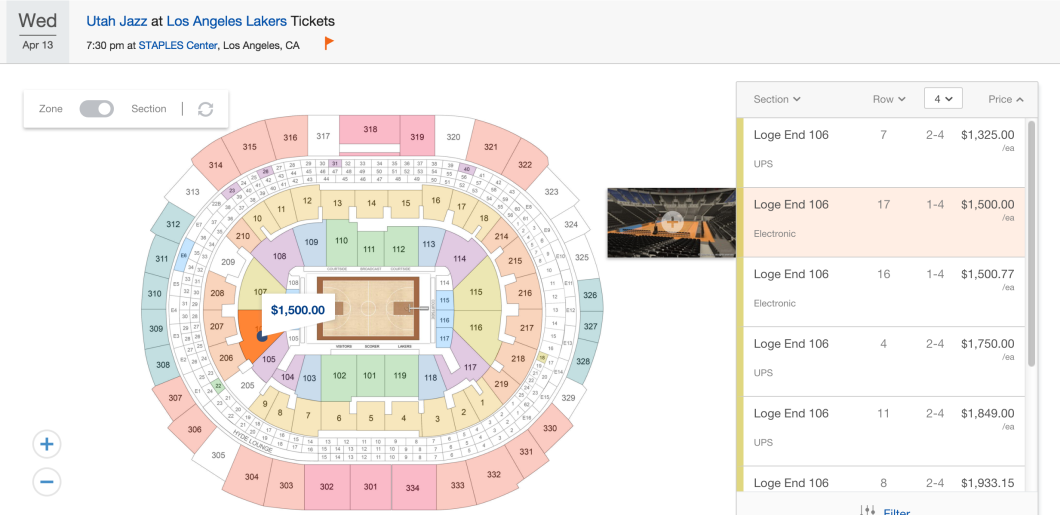How StubHub’s Policies Let Greedy Ticket Sellers Screw Fans Over Image courtesy of Mike Mozart
If you buy tickets on StubHub, they come with a guarantee, which is great. Additionally, any seller who cancels tickets after they’ve been sold could face a financial penalty for doing so. But that penalty doesn’t seem to be enough to stop the most unsavory sellers from violating the rules.
This week, an L.A. Lakers fan made national news after he complained to The Lead Sports about having his StubHub tickets to Kobe Bryant’s final game canceled after he’d already purchased them.
Back in November, before Bryant officially announced that this season would be his last, the fan and three of his friends figured they might as well buy tickets for the last game of the season just in case it was also Kobe’s final outing in a Lakers uniform.
So he bought the tickets — four seats in row 17 of Sec. 106 of the Staples Center — and then got incredibly lucky (or so he thought) when Kobe subsequently confirmed his plan to retire.
Then, on Dec. 15, two weeks after dropping the retirement bomb, the fan got an email from StubHub giving him the bad news: The order had been cancelled because the “seller let us know that they were listed incorrectly.”
Rubbing salt in the wound, StubHub said that no replacement tickets could be provided because similar seats were now going for nearly $2,000 each — ten times what he’d paid for his seats.
You can read the full, disheartening email chain on The Lead Sport, but it basically involves the fan fruitlessly banging his head against a wall of incompetence and general shruggery at StubHub, where someone actually had the temerity to conclude a response with “I do hope you find cheaper tickets very soon.”
Speaking with SFGate.com, a rep for StubHub was apologetic and pointed out that the company’s user agreement states that “Under no circumstances may Sellers cancel orders at one price and repost the same tickets for a higher price. Failure to fulfill your orders will lead to charges as stated in the Seller Policies.”
But as Sports Illustrated’s Brendan Maloy noted, that penalty is only “20% of the ticket price.”
The fan originally paid $195 each for his tickets. So the seller was hit with about a $40/ticket penalty.
Right now, if you want to purchase four tickets in that same section, you’ll pay at least $1,325 — per ticket. In fact, there are four seats in the very row where he was supposed to be sitting… at a price of $1,500 a pop:

Assuming the original seller for these tickets was able to get at least $1,000 each for the seats he’d originally sold for $195, that means he made $4,000 minus the approximately $160 in penalties… so $3,840.
We’ve seen the same thing happen with ticket resellers at the Super Bowl, where they realize — as late as the day before the very game — that they can make more money by canceling bona fide orders and selling to some deep-pocketed latecomer.
“The reality is that these instances happen less than 1% of the time,” says the StubHub rep, who probably doesn’t realize how huge that small percentage actually is in real-world terms.
Think about it: The Staples Center seats 19,000 people for a basketball game. One percent of 19,000 is 190. Even it’s one-tenth of 1%, you’re still talking about 19 fans who could be getting screwed over by greedy resellers — and that’s for a single game at a single venue, for a team that is really, really horrible at basketball right now.
Even if it’s just this fan and his four friends, that’s still not acceptable. There is no reason to give sellers such an easy out.
And in fact, it’s possible that StubHub could have done something to compel this seller to make good on his offer.
In addition to the 20% penalty for canceling purchased tickets, StubHub “reserves the right in its sole discretion to charge your payment method the full amount of the replacement costs StubHub incurs under the FanProtectT Guarantee (including costs in excess of 20% of the ticket price).”
To us, that means that if StubHub had to go and get this fan some pricey new tickets from someone else, the company had the legal right to charge that cost to the greedy reseller who canceled the original order.
There is a happy ending to this story. After his tale of woe got heard ’round the world, various NBA sponsors and other companies looking for good publicity reached out to offer him better tickets than the ones he’d been screwed out of.
Want more consumer news? Visit our parent organization, Consumer Reports, for the latest on scams, recalls, and other consumer issues.

